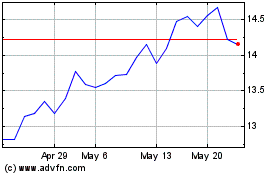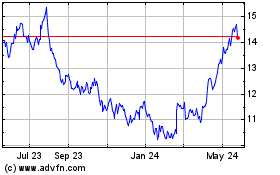Asian Shares Mixed With Nikkei Higher on Upbeat Data
14 November 2016 - 4:10PM
Dow Jones News
Asian equity markets were mixed early Monday, with Japan's
Nikkei outperforming regional markets following
stronger-than-expected economic data and a weaker yen.
The Nikkei Stock Average was up 1.5% in morning trade, becoming
the day's biggest outperformer by far. In other markets,
Australia's S&P/ASX 200 was down 0.8%, Singapore's FTSE Straits
Times Index was off 1.0%, and Hong Kong's Hang Seng Index declined
1.4%.
Government data in Japan showed that its third-quarter gross
domestic product expanded an annualized 2.2% in the three months
ended September, beating expectations of a 0.9% expansion, as
forecast by economists polled by The Wall Street Journal.
Monday's data also marked the third straight quarter of
expansion in Japan, after a patchy economic performance in the
three years since the summer of 2013.
Japan's economy will likely continue its gradual recovery, said
economy minister Nobuteru Ishihara in a statement on Monday, citing
"improvements in employment and wage conditions."
The latest growth figures also showed that residential
construction rose in the country, after borrowing rates fell. Lower
rates have fueled demand for property investments. Among individual
real estate companies, Mitsui Fudosan rose 3.5%, Mitsubishi Estate
added 2.1% and Sumitomo Realty & Development climbed 2.3%.
Meanwhile, the yen fell against the dollar, and was recently
down 0.7%, making it cheaper for exporters to ship their goods
around the world. Export-oriented stocks surged, with Mazda Motor
up 4.6% and Toshiba gaining 2.9%.
Elsewhere in the region, markets were under pressure as
investors clung to an optimistic view that President-elect Donald
Trump might be able to stimulate growth in the U.S. economy,
following the election last week.
This could see U.S. interest rates rise at a faster pace next
year, triggering outflows from emerging market equities, said Mixo
Das, Southeast Asia Equity Strategist at Nomura.
"Much of the pain was felt on Friday and we're just drifting
slightly lower," said Mr. Das. "I think we'll continue to see
choppy trading."
A selloff continued among Hong Kong property developers given
the concerns of a faster interest rate increase in the U.S., a move
that will hurt the city's real-estate market. The city's currency
peg to the U.S. dollar means that local monetary policies move in
lockstep to adjustments in the U.S.
The Hang Seng Property subindex was last off 2.4%. Among key
developers, Wharf Holdings fell 2.4%, while Sun Hung Kai Properties
fell 1.9%.
In mainland China, stock markets opened down but quickly began
to rally after a strong showing last week led to equities entering
a technical bull market.
A slew of data released Monday also supported a view that the
world's second-largest economy is stabilizing, with industrial
output growth stabilizing, fixed-asset investment growth lightly
accelerating, while retail sales slowed, according to official
data. The Shanghai Composite Index was last up 0.2%, while the
Shenzhen Composite Index added 0.3%.
Looking ahead, the market will remain focused on the U.S.
Federal Reserve's meeting in December, with interest rates likely
to rise, say analysts. According to CME Group's Fedwatch tool, the
probability of an increase in December has risen to 81.1% from
71.5% previously.
"The market is now focusing on...the rate hike planned for
December [by the Federal Reserve]," said Alex Wijaya, a senior
sales trader at CMC Markets, in a note.
Suryatapa Bhattacharya, Liyan Qi and Anjie Zheng contributed to
this article.
(END) Dow Jones Newswires
November 13, 2016 23:55 ET (04:55 GMT)
Copyright (c) 2016 Dow Jones & Company, Inc.
Hang Seng Bank (PK) (USOTC:HSNGY)
Historical Stock Chart
From Nov 2024 to Dec 2024

Hang Seng Bank (PK) (USOTC:HSNGY)
Historical Stock Chart
From Dec 2023 to Dec 2024
